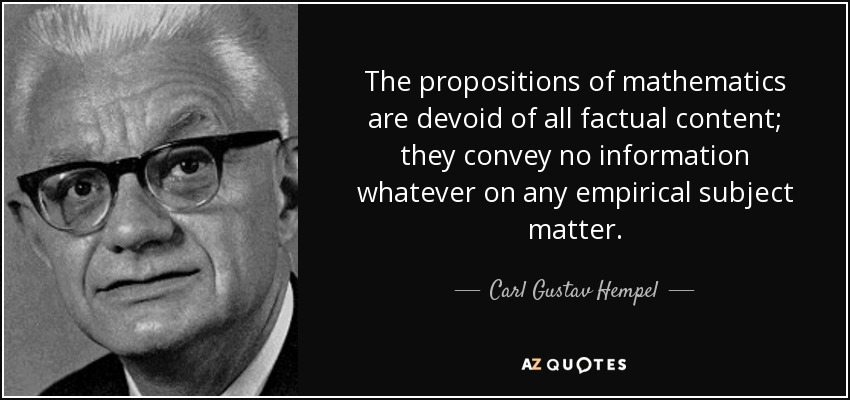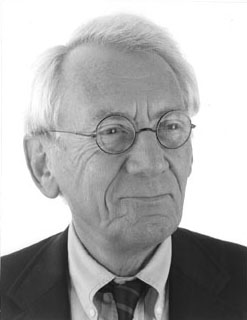Carl Gustav Hempel
Carl Gustav Hempel ( born January 8, 1905 in Oranienburg, † November 9, 1997 in Princeton, New Jersey ) was a German philosopher in the tradition of logical positivism. He has worked with Paul Oppenheim Hempel - Oppenheim scheme ( DN ) model of scientific explanation, and later further developed alone.
Life
Hempel grew up in, which was founded by intellectuals on the outskirts of Oranienburg settlement Eden, the oldest vegetarian settlement in Germany, where the dream of life, economic and land reform should become a reality. He attended a grammar school in Berlin and began his studies in 1923 at the University of Göttingen in mathematics and philosophy. Here he met David Hilbert know and was fascinated by the idea of proving the consistency of mathematics using elementary methods.
After a short stay in Heidelberg he studied from 1924 in Berlin mathematics, philosophy and physics. In 1929 he took part in the first congress of scientific philosophy, which was organized by the Berlin positivists. Here he met Rudolf Carnap, of which he was so impressed that he moved to Vienna and obtained a place in the Vienna Circle. In 1934 he received the degree of Doctor of the University of Berlin with a dissertation on probability theory. Appraiser should originally be the philosopher of science Hans Reichenbach, who, however, had to emigrate for "racial " reasons ( experts were now the philosopher Nicolai Hartmann and the psychologist Wolfgang Köhler ).
Hempel himself walked with the help of Paul Oppenheim from Belgium. Both published in 1936 together the book The type concept in the light of the new logic.
1937 Hempel received an invitation from the University of Chicago as a research assistant of philosophy. In 1939 he emigrated - he was married to the Jewess Eva Ahrends - in the United States. He taught at the City College of New York and from 1940 to 1948 at Queens College. He worked at this time with issues of confirmation and explanation of scientific statements, issuing several essays.
From 1948 to 1955 Hempel taught at Yale University from 1955 until his retirement in 1974 in Princeton. In 1961 he was president of the American Philosophical Association Eastern Division. In 1974, he went to 1976 at the Hebrew University in Jerusalem and from there to 1985 to Pittsburgh.
He was born in Oranienburg imaginary ( excitation at Horst Wolfgang Boger following ) as the first German city of his by the languor Hagen street renamed " Carl Gustav Hempel Street " on 8 January 2005. From the University of Constance, he was awarded an honorary doctorate in the Department of Philosophy. The Department of Economics at the Free University of Berlin awarded him on 10 December 1984 also an Honorary Doctorate.
Work
Hempel made significant contributions to the philosophy of science of logical empiricism. In his later years he turned from the logical empiricism by having approached the position of Thomas S. Kuhn, who formerly held position remained connected by critical word messages.
Hempel developed together with Paul Oppenheim Hempel - Oppenheim scheme or legislative scheme, a theory of explanation. After this deductive- nomological explanation, an event can be explained, it can be deduced from general laws and a number of special initial conditions.
The Rabenparadox, also known as Hempel's paradox, belongs to the realm of the theory of inductive confirmation.
Hempel has pointed out that the term real definition three different classes can be understood by cases: the nominal definition, the meaning analysis or empirical analysis.
Writings
- Contributions to the logical analysis of the concept of probability. Thesis. Berlin. New Hahn, Jena, 1934.
- About the content of probability statements. In: knowledge. Volume 5, 1935/1936, pp. 228-260.
- With Paul Oppenheim: The type concept in the light of the new logic. Sijthoff, Leiden 1936.
- Le problème de la vérité. In: Theoria. Volume 3, 1937, pp. 206-246.
- The Function of General Laws in History. In: The Journal of Philosophy. Volume 39, 1942, pp. 35-48.
- Studies in the Logic of Confirmation. In: Mind. Volume 54, 1945, pp. 1-26 and 97f.
- Fundamentals of Concept Formation in Empirical Science. University of Chicago Press, Chicago, 1952. Broad concept formation in empirical science. Bertelsmann University Press, Dusseldorf 1974.
- Philosophy of science. German Taschenbuch Verlag, Munich 1974, ISBN 3-423-04144-7.
Essay collections:
- Aspects of Scientific Explanation and Other Essays in the Philosophy of Science. Free Press, New York 1965, ISBN 0-02-914340-3. Aspects of scientific explanation. de Gruyter, Berlin 1977.









